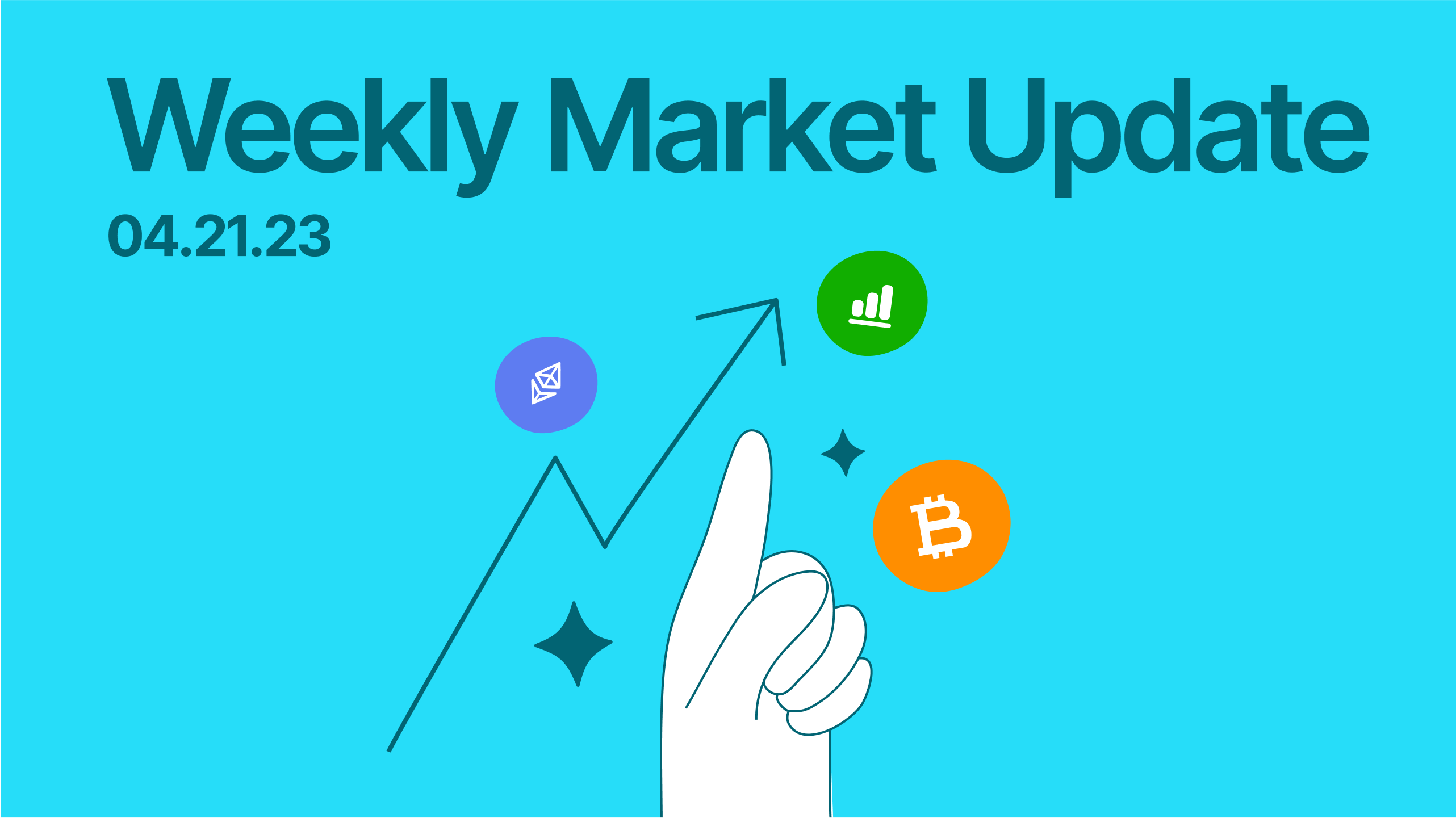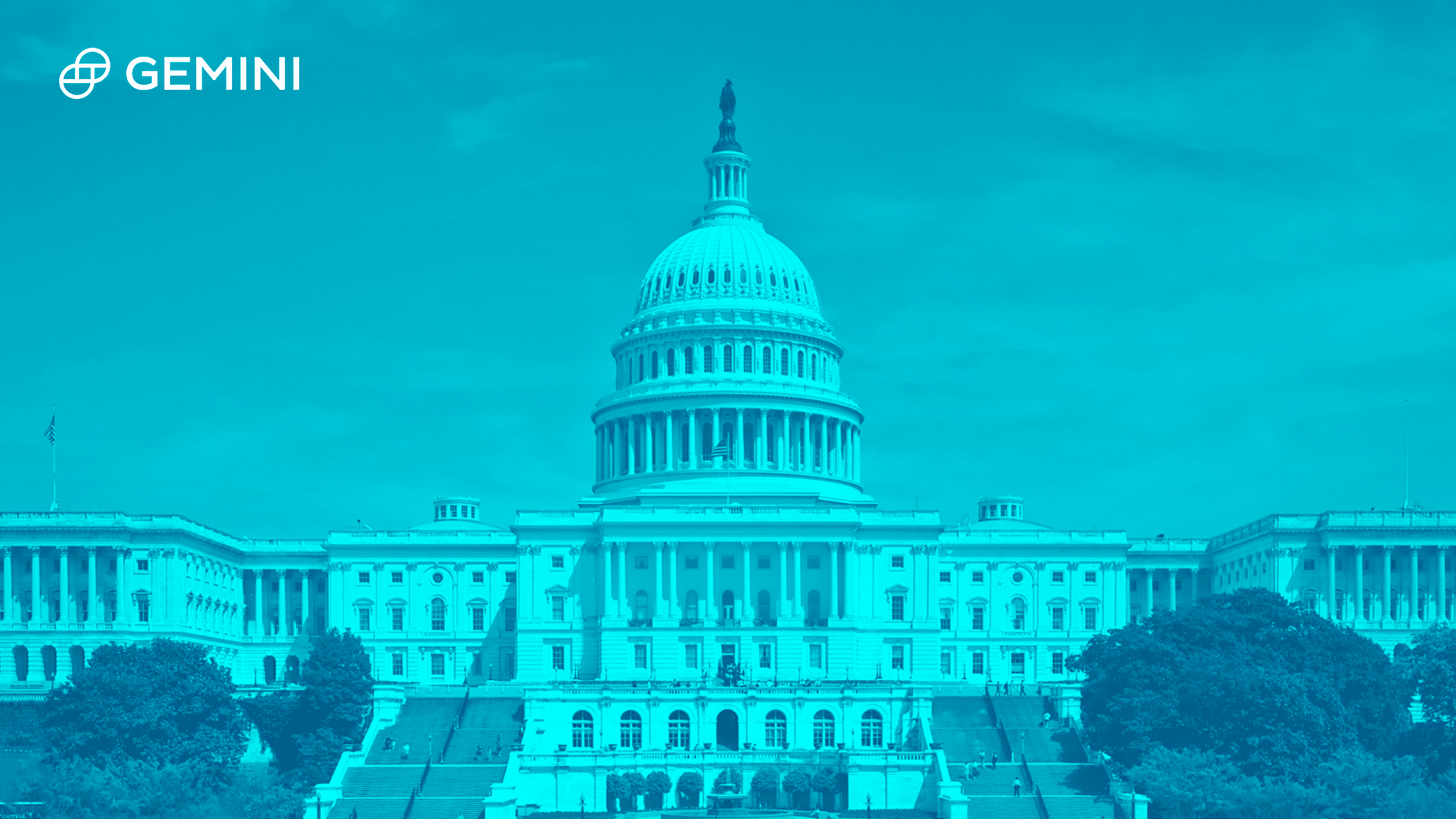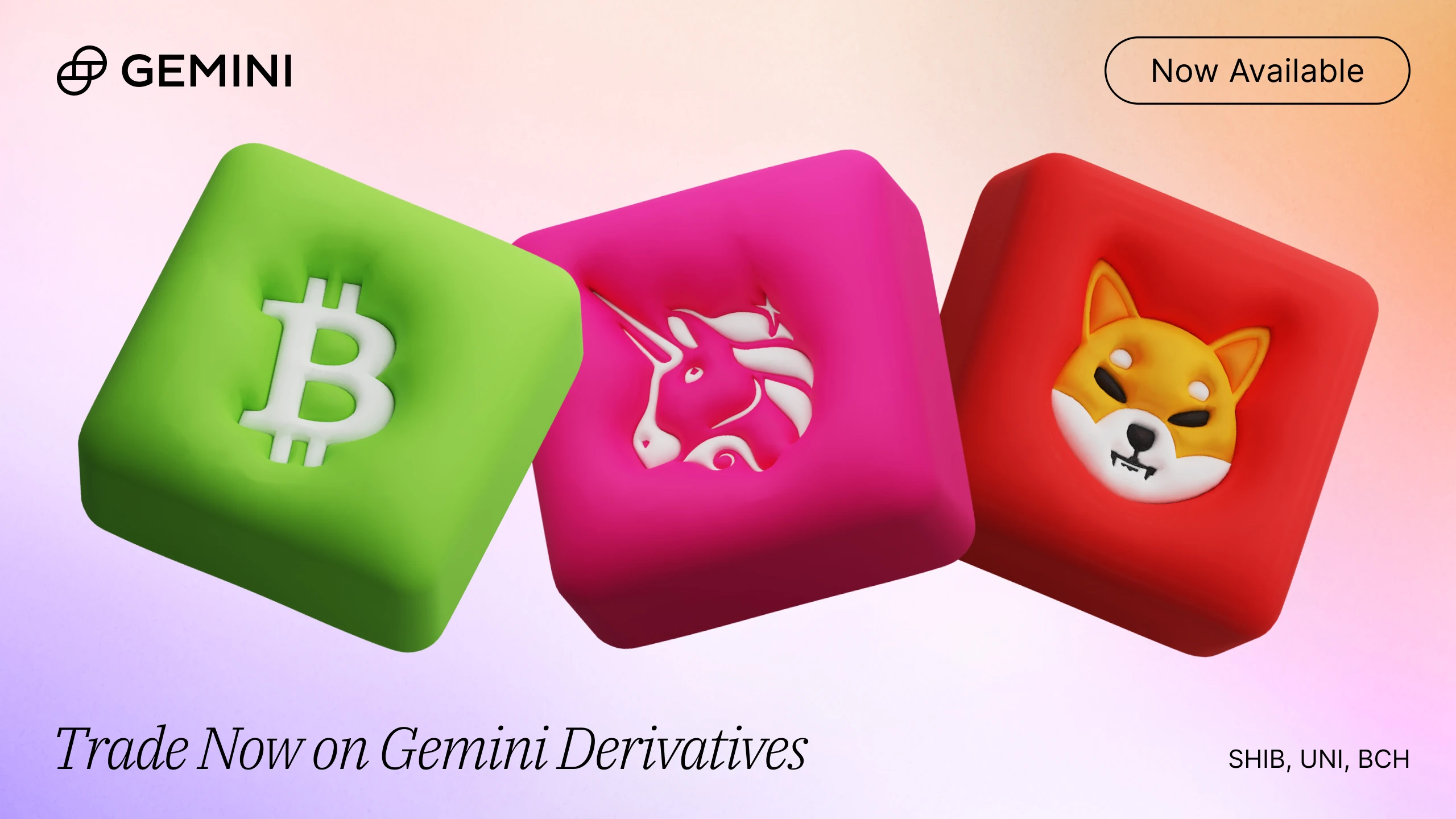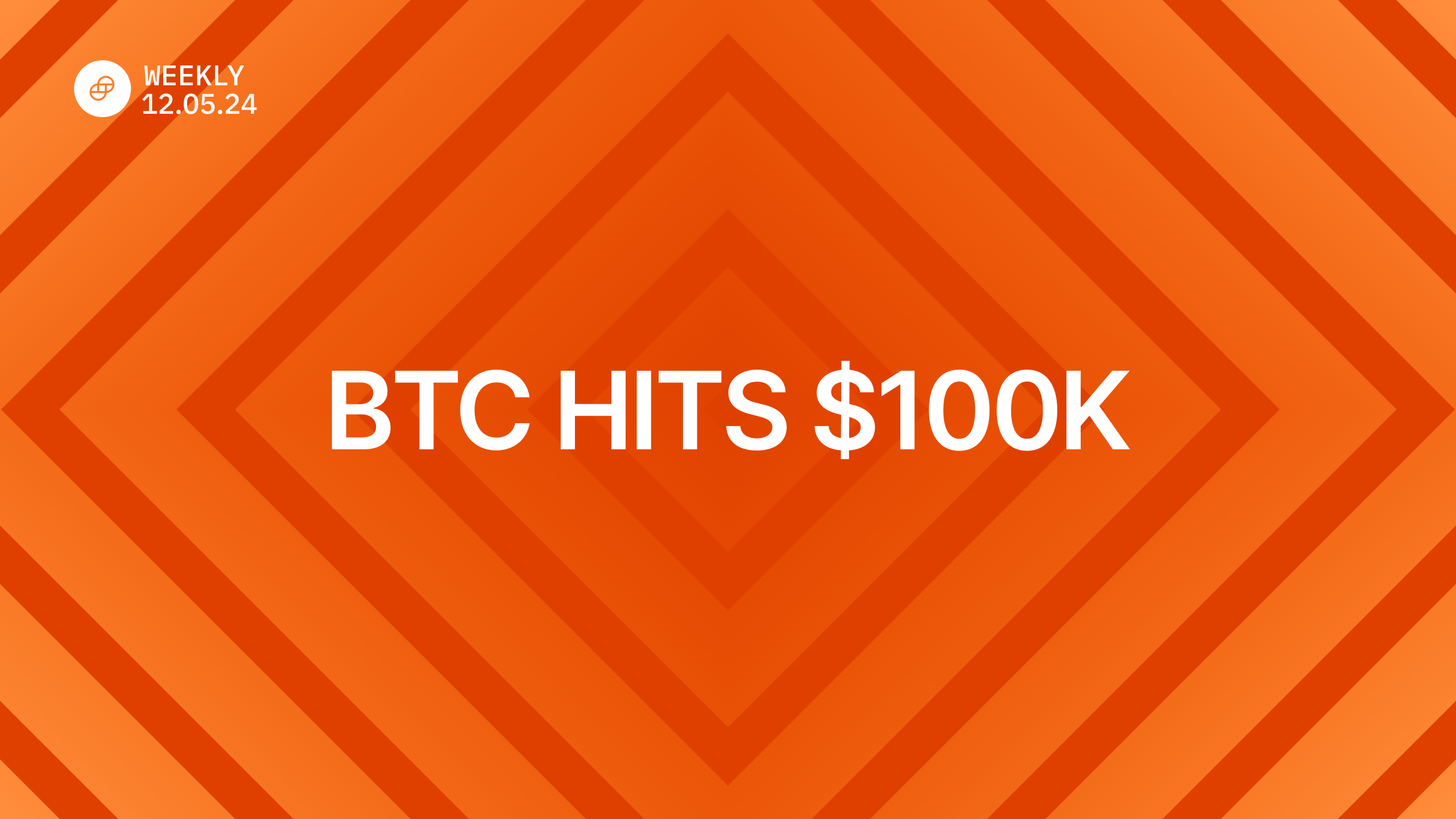Home del blog
WEEKLY MARKET UPDATE
APR 21, 2023
Weekly Market Update - Friday, April 21, 2023

Welcome to our Weekly Market Update.* Explore weekly crypto price movements, read a quick digest of notable market news, and dive into a crypto topic — this week we discuss decentralized exchanges (DEXs).
Crypto Movers This Week
Crypto News: What Happened This Week?
Crypto Topic of the Week: Decentralized Exchanges (DEXs)

Crypto Movers This Week (7D)
Bitcoin (BTC) Price | ⬇️ 7.47% | $27,965
Ether (ETH) Price | ⬇️ 7.93% | $1,889
Immutable X (IMX) Price | ⬇️ 15.10% | $0.999
Lido DAO Token (LDO) Price| ⬇️ 14.30% | $2.127
Civic (CVC) Price | ⬆️ 6.71% | $0.1178
Crypto prices as of Friday, April 21, 2023, at 11:50am ET. Percentages reflect trends over the past seven days. Check out the latest crypto prices here. All prices in USD.
Crypto News: What Happened This Week?
Takeaways
Following a month-long rally, crypto prices dipped this week as bitcoin (BTC) fell below $30k USD. The U.S. banking system showed signs of stability with several large U.S. banks beating earnings expectations despite a drop in overall bank deposits.
Stablecoins were discussed in Congress as draft legislation was introduced that would put non-bank stablecoins under the purview of the U.S. Federal Reserve. The European Union approved MiCA, a law that will implement a regulatory framework for crypto companies. In the altcoin world, a new meme token surged as it took over crypto Twitter.
Crypto Prices Move Lower as Banking System Stabilizes
Bitcoin (BTC) prices fell below the psychological $30k USD level, accompanied by a broader move lower across the crypto markets. The dip came after the BTC-as-a-safe-haven narrative gained traction over the past month and helped push prices higher following the collapse of Silicon Valley Bank, Signature, and Silvergate.
Following the Shapella upgrade last week, ether (ETH) prices showed resilience and outperformed amidst the broader crypto market downturn. Although ETH dropped below the $2,000 USD level on Wednesday morning, the ETHBTC pair continues to hold above the 50-day moving average of ~0.067, which it broke through following the Shapella upgrade.
Bank Q1 Results Ease Financial System Concerns
Concerns over potential further banking collapses have eased over the last few weeks, bolstered by strong bank Q1 results. Over the past 10 days, some of the largest U.S. banks, JPMorgan Chase, Citigroup, and Wells Fargo appeared to emerge from the crisis unscathed, comfortably beating earnings expectations.
First quarter results from a number of smaller U.S. banks including Charles Schwab, State Street, BNY Mellon, and Western Alliance all showed an exodus of deposits, although those numbers did rise again for some banks toward the end of March, showing signs of stabilization and supporting a rally in stock prices.
Stablecoin Bill Proposed in U.S. Congress
The U.S. House of Representatives released a discussion draft that would regulate stablecoins. The proposed legislation would place non-bank stablecoins under the purview of the U.S. Federal Reserve and require them to gain approval before being issued.
Stablecoin issuers would have to hold reserves on a one-to-one basis and provide proof of reserves to the Fed to get approval. Those reserves would need to be composed of U.S. Treasury bills, U.S. dollars, repurchase agreements backed by Treasury bills, and central bank reserve deposits, according to the draft bill’s text.
The draft also imposes a two-year moratorium on algorithmic stablecoins (“endogenously collateralized”), while grandfathering in those already in existence. The discussion draft was debated during a U.S. House Financial Services Committee hearing on Wednesday, where Rep. Maxine Waters (D-CA) suggested that lawmakers should disregard the current bill and start from scratch on stablecoin regulation.
UK Inflation Continues to Soar
In the UK, inflation data came in higher than expected on Wednesday, remaining in double digits at 10.1% as food prices and energy bills continued to soar, suggesting the Bank of England will further hike interest rates.
European Union Lays Framework for Crypto Regulation
On Thursday, European lawmakers overwhelmingly approved the EU’s Markets in Cryptoassets, or MiCA, regulation that lays out an explicit framework to regulate crypto companies. Under the law, which is expected to be enacted in July, crypto asset service providers that serve clients in the EU must obtain licenses from the relevant national authorities. There will also be additional governance and liquidity requirements.
The law provides explicit and standardized guidelines for crypto companies in the EU that some industry members have long sought, potentially creating a more predictable regulatory environment.
Meme Coins Return to the Spotlight
Altcoin prices had an up-and-down week, with some tokens posting double-digit declines while others rallied. Pepe token (PEPE) took over crypto Twitter, resulting in the new meme coin branded after the internet meme “Pepe the Frog” gaining thousands of percent in a matter of days. Its market capitalization skyrocketed to above $100m USD earlier in the week and currently has over 30,000 individual holders according to Etherscan.
Other popular meme coins received a boost as a result, with Dogecoin (DOGE) +10% and Baby Doge Coin (BABYDOGE) +35% earlier in the week before pairing the gains by Friday.
-From the Gemini Trading Desk

Crypto Topic of the Week: A Primer on DeFi — Decentralized Exchanges
Decentralized finance (DeFi) is a blockchain-based financial framework built on decentralized blockchain protocols and underlying smart contract technology. In general terms, DeFi provides access to different types of financial products and services without interacting with a centralized intermediary.
DeFi has played a central role in the development of the crypto ecosystem over the past years, particularly with the ability to build decentralized applications (dApps) on blockchain networks that leverage smart contract technology like Ethereum. This week we explore one of the central components of the DeFi ecosystem — decentralized exchanges (DEXs).
What is a DEX?
A decentralized exchange (DEX) is a peer-to-peer (P2P) marketplace that connects cryptocurrency buyers and sellers. DEXs are also non-custodial, meaning a user remains in control of their private keys when transacting on such platforms.
DEXs employ smart contracts that self-execute under set conditions and record each transaction to the blockchain. These trustless, secure transactions represent an accelerating segment of the crypto market, and are pioneering new financial products.
How Does Trading Crypto on a DEX Work?
To create a market, DEXs will typically use what are known as automated market makers (AMMs), which allow for trades to be executed automatically through the use of liquidity pools.
Liquidity pools are mechanisms by which users can pool their assets in a DEX’s smart contracts to provide asset liquidity for traders to swap between cryptos. Those providing liquidity to liquidity pools often earn trading fees or crypto rewards from the DEXs upon which they pool tokens, usually being rewarded with liquidity provider (LP) tokens.
In short, DEXs pool tokens and provide a decentralized venue for traders to interact with liquidity pools that are governed by smart contracts.
The DEX Ecosystem
The DeFi ecosystem evolves quickly, and three popular DEX models that have emerged include: Uniswap, Curve, and Balancer.
- Uniswap’s technology allows users to create a liquidity pool with any pair of ERC-20 tokens with a 50/50 ratio.
- Curve specializes in creating liquidity pools of similar assets such as stablecoins, and as a result, offers low rates and efficiency.
- Balancer stretches the limits of Uniswap by allowing users to create dynamic liquidity pools of up to eight different assets in any ratio, expanding AMMs’ flexibility.
Learn more about liquidity pools, AMMs, and the overall DEX landscape on Cryptopedia.
See you next week. Onward and Upward!
Team Gemini
*This material is for informational purposes only and is not (i) an offer, or solicitation of an offer, to invest in, or to buy or sell, any interests or shares, or to participate in any investment or trading strategy, (ii) intended to provide accounting, legal, or tax advice, or investment recommendations, or (iii) an official statement of Gemini. Gemini, its affiliates and its employees do not make any representation or warranty, expressed or implied, as to accuracy or completeness of the information or any other information transmitted or made available. Buying, selling, and trading cryptocurrency involves risks, including the risk of losing all of the invested amount. Recipients should consult their advisors before making any investment decision. Any use, review, retransmission, distribution, or reproduction of these materials, in whole or in part, is strictly prohibited in any form without the express written approval of Gemini.
ARTICOLI CORRELATI

COMPANY
DEC 11, 2024
A Message From Gemini’s Chief Legal Officer

DERIVATIVES
DEC 10, 2024
Introducing Three New Perpetual Contracts on Gemini’s Derivatives Platform: SHIB/GUSD, UNI/GUSD, BCH/GUSD

WEEKLY MARKET UPDATE
DEC 05, 2024